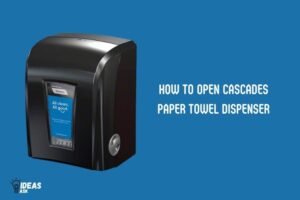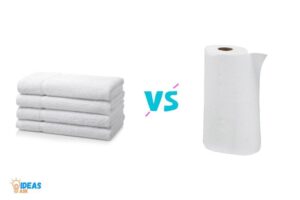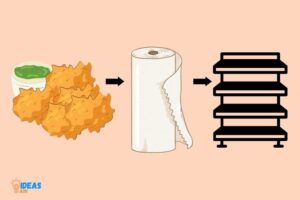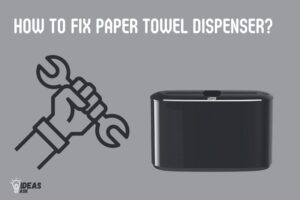Can You Compost Paper Towel Rolls? Yes!
Yes, you can compost paper towel rolls.
Paper towel rolls are made from cardboard, which is a biodegradable material consisting mainly of cellulose fibers derived from wood.
These fibers can be broken down and decomposed by microorganisms in a compost pile, making paper towel rolls a suitable addition to your compost.
When composting paper towel rolls, make sure they are free from contaminants such as grease, oil, or chemical cleaning agents. These substances can be harmful to the microorganisms in your compost pile and may slow down the decomposition process.
To speed up the composting process, shred or tear the rolls into smaller pieces before adding them to your pile. This will increase the surface area and make it easier for the microorganisms to break down the cardboard fibers.
Different Types of Paper Towels Which are Compostable or Not
| Paper Towel Type | Can You Compost? | Notes |
|---|---|---|
| Plain, unbleached | Yes | Make sure they are not contaminated with grease or chemicals. Tear or shred into smaller pieces to speed up composting. |
| Plain, bleached | Yes, but with caution | Bleached paper towels may contain chemicals that can affect your compost. Use in moderation and avoid using bleached towels with chemical residues. |
| Printed or colored | No | Inks and dyes can contaminate your compost, so it’s best to avoid composting printed or colored paper towels. |
| Paper towels with food residue | Yes, but with caution | Composting paper towels with food residue can attract pests. Make sure to bury them well within your compost pile, and avoid composting meat, dairy, or oily foods. |
| Paper towels contaminated with chemicals | No | Avoid composting paper towels that have been in contact with cleaning chemicals, as they can be toxic to the composting process. |
Key Takeaway: Compostable Paper Towel Rolls
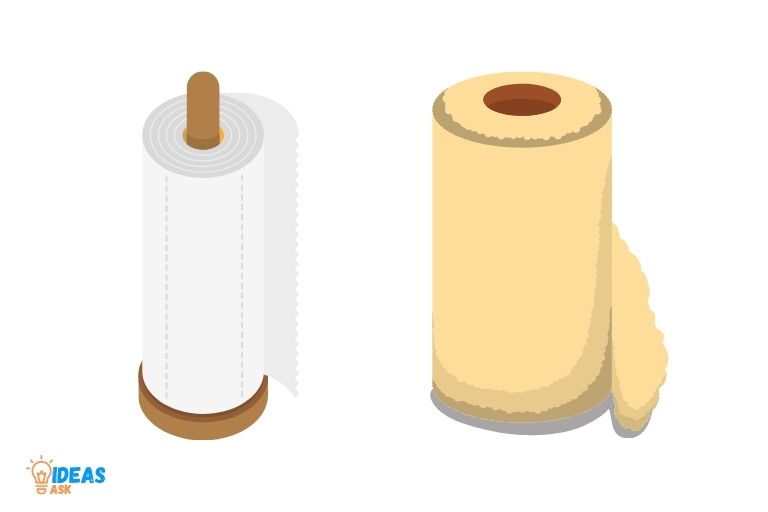
Five Facts About Paper Towel Rolls Compostability
Understanding Paper Towel Rolls: Their Compostability And Impacts
Definition Of Paper Towel Rolls
Paper towel rolls are cylindrical cardboard tubes wrapped with paper towels used for various cleaning purposes at homes and workplaces. They are available in different sizes and varieties, each made of different materials and components.
Components And Materials Used In Making Paper Towel Rolls
Paper towel rolls consist of two components – the cardboard core tube and the paper towel sheet.
The cardboard tube is made of recycled paper and cardboard pulp, while the sheets are usually made of wood pulp. Some paper towels may include synthetic fibers, adhesives, or bleach.
How Paper Towel Rolls Affect The Environment
While paper towel rolls are made from recyclable materials, they still have some environmental impacts. Here are a few ways in which paper towel rolls affect the environment:
- Deforestation: The production of paper towels requires cutting down trees, leading to habitat destruction and biodiversity loss.
- Energy consumption: It takes a lot of energy to manufacture paper towel rolls, contributing to greenhouse gas emissions.
- Waste generation: Paper towel rolls produce waste when they are disposed of after use and add to the landfill load.
However, paper towels can be composted, reducing their environmental impact. Composting can help turn them into nutrient-rich soil and reduce the amount of waste that goes to landfills.
To sum up, composting paper towel rolls is an eco-friendly way to dispose of them while reducing waste and promoting composting benefits.
Is Composting Paper Towel Rolls A Good Idea?
Can You Compost Paper Towel Rolls?
If you are practicing composting at home, you might be wondering if you can compost paper towel rolls. Paper towel rolls may seem like an ideal organic material to compost, but are they really?
We will delve into the question of composting paper towel rolls and explore the benefits and shortcomings of this practice.
How Composting Works: A Brief Overview
Composting is the process of breaking down organic material using microorganisms to create nutrient-rich fertilizer for plants.
This process requires the presence of four main components: carbon (brown material), nitrogen (green material), water, and air. Composting is a simple and effective way to reduce waste and improve soil quality.
Benefits Of Composting Paper Towel Rolls
Composting paper towel rolls can bring about many benefits. Some of these benefits include:
- Adding to the brown material. Paper towel rolls are high in carbon, which makes them the perfect brown material to complement nitrogen-rich green materials in a compost bin or pile.
- Reducing landfill waste. By composting paper towel rolls at home, you contribute to reducing the amount of waste sent to landfills.
- Saving money. If you compost paper towel rolls, you will spend less on buying commercial fertilizer in the long run. Plus, you will have the satisfaction of knowing you are using a natural product that is good for the environment.
Drawbacks Of Composting Paper Towel Rolls
Although composting paper towel rolls can be beneficial, it is not without its shortcomings.
Some of these drawbacks include:
- Risk of contamination. If paper towel rolls have come into contact with non-compostable materials or hazardous chemicals, they can contaminate your compost heap or bin.
- Breaking down takes time. Paper towel rolls take longer to break down compared to other organic material such as food scraps or yard waste. This means that it might take a while before you can use the compost as fertilizer.
- Storage can be difficult. Paper towel rolls take up space, which might be an issue if you have limited storage space.
Composting paper towel rolls is a good idea as long as it is done correctly and with caution. Paper towel rolls add to the brown material necessary for composting, reduce landfill waste, and save money.
But they also come with the risk of contamination, take longer to break down, and can be difficult to store. Consider these factors before you decide to compost your paper towel rolls.
How To Compost Paper Towel Rolls Properly
Types Of Composting: Which One Is The Best Fit?
There are different types of composting methods that you can use to decompose organic waste like paper towel rolls.
Here are the three common types of composting and their benefits:
- Backyard composting: This method is ideal for people with gardens and some backyard space. You can use a compost bin or prepare a compost pile to decompose organic waste. Backyard composting produces a nutrient-rich soil amendment that improves soil fertility.
- Vermicomposting: This method uses earthworms to break down organic waste material. You can either use a worm bin indoors or outdoors to compost paper towel rolls and other organic waste. Vermicomposting produces a high-quality compost that is rich in nutrients and beneficial microorganisms.
- Bokashi composting: This method uses a specific type of microorganisms to break down organic waste material. Bokashi composting is an excellent way to compost food waste and paper towel rolls, but it requires a specific type of inoculated bran and an airtight container. However, this method produces a high-quality compost that is rich in nutrients, beneficial microorganisms, and has a sweet smell.
Composting Tools And Materials: What Do You Need?
Composting paper towel rolls requires specific tools and materials to ensure that the process is successful.
Here are the must-have tools and materials for composting:
- Compost bin/pile: You need a compost bin or pile to hold the organic waste material as it decomposes. Take into account the size of your household, and how much compost you want to produce when choosing a compost bin or pile.
- Gardening gloves: Gardening gloves protect your hands while handling the composting material.
- Pitchfork or shovel: You will need a pitchfork or shovel to turn the compost material and ensure aeration.
- Composting materials: Composting paper towel rolls requires carbon-rich materials like paper towel rolls, leaves, and newspaper, and nitrogen-rich materials like food scraps, grass clippings, and coffee grounds.
- Water: Water is essential in composting as it keeps the compost moist, encourages decomposition, and ensures that the compost pile reaches the optimal temperature range.
Step-By-Step Guide To Composting Paper Towel Rolls
Composting paper towel rolls is an easy process, but it requires specific steps to ensure that the composting material properly decomposes.
Here’s a step-by-step guide to composting paper towel rolls:
- Collect your composting material such as paper towel rolls, food scraps, and yard waste, and place them in a bin/pile.
- Ensure that the composting material is evenly distributed in the compost bin/pile and alternate between nitrogen-rich and carbon-rich materials.
- Add water to the compost bin/pile to keep it moist, but not wet.
- Turn the compost pile using a pitchfork or shovel every few weeks to aerate it and ensure that every part of the material breaks down.
- Monitor the compost pile’s temperature, ensuring that it stays between 135-160 degrees fahrenheit.
- In three to six months, the organic waste material will decompose, and you will have nutrient-rich compost ready for gardening.
With the above guide, you can now compost paper towel rolls without any challenges. Choose the right composting method depending on your situation and start composting today.
By composting paper towel rolls, you reduce landfill waste, improve your soil, and create nutrient-rich compost for your garden.
Alternative Ways To Use Paper Towel Rolls
Paper towel rolls are a common household item that often end up in the trash. But did you know that you can compost them instead?
Composting paper towel rolls is an excellent way to reduce your household waste and create nutrient-rich soil.
In this blog post, we will discuss whether or not you can compost paper towel rolls and share alternative ways to use them.
Creative Ways To Reuse Paper Towel Rolls
If you’re looking for other ways to use paper towel rolls instead of throwing them away or composting them.
Here are some creative ideas:
- Seed starters: Cut the paper towel rolls in half and fill them with soil. Add seeds and water as needed until the seedlings are strong enough to be transplanted.
- Gift wrapping: You can use paper towel rolls to wrap small gifts and hold them together.
- Desk organizers: Cut the paper towel rolls into different sizes and use them to store pens, pencils, and other office supplies.
- Cat toys: Cut the paper towel rolls into small rings and combine them to make a ball. Cats love playing with these types of toys!
Eco-Friendly Alternatives To Paper Towel Rolls
If you want to reduce the amount of waste you produce, consider switching to eco-friendly alternatives of paper towel rolls.
Here are some options to try:
- Reusable cloth towels: A great alternative to paper towels is using reusable cloth towels that you can wash and reuse again and again.
- Bamboo paper towels: These are washable and durable towels that can replace traditional paper towels.
- Organic cotton roll towels: Made from 100% organic cotton, these towels are a sustainable and eco-friendly alternative to paper towels.
Paper towel rolls are compostable, and there are many creative and eco-friendly ways to reuse and recycle them.
By taking these simple steps, you can reduce your household waste and contribute to a more sustainable future. So, the next time you use a paper towel roll, remember that it doesn’t have to end up in the trash!
FAQ Of Compost Paper Towel Rolls
Can You Compost Paper Towel Rolls?
Yes, you can compost paper towel rolls as they are safe and biodegradable.
How Do You Prepare Paper Towel Rolls For Composting?
To prepare paper towel rolls for composting, remove any remaining tissue and break them into smaller pieces.
What Are The Benefits Of Composting Paper Towel Rolls?
Composting paper towel rolls reduces waste, saves landfill space, and produces organic fertilizer.
Can Paper Towel Rolls Be Composted With Other Materials?
Yes, paper towel rolls can be composted with other organic materials such as food waste, grass clippings, and leaves.
Conclusion
It’s clear that paper towel rolls are not only convenient for cleaning, but also environmentally sustainable. The decision to compost these rolls, however, can raise questions about safety and effectiveness. Based on our research, it’s safe to compost paper towel rolls as long as they are clean and free of chemical residue.
They can add valuable nutrients to your compost pile and help reduce waste. However, it’s important to monitor your compost pile’s temperature and moisture levels to ensure that the rolls are breaking down properly.
If you’re still unsure, you can always recycle the rolls or find an alternative eco-friendly option. In the end, composting paper towel rolls is just one small step we can take towards a more sustainable future.


